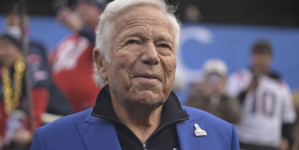-
How To Watch ‘Squid Game’ Before The New Season Premieres - 16 mins ago
-
How a Duct-Taped Banana Sold for $6.2 Million - 43 mins ago
-
Map Shows US States With Highest Levels Of Long COVID - 51 mins ago
-
Patriots Owner Robert Kraft Once Again Denied Induction into Hall of Fame - about 1 hour ago
-
The Alluring Dream That Black America Needs to Wake Up From - about 1 hour ago
-
Brooke Shields’ 2-Word Nickname for George H. W. Bush - 2 hours ago
-
The Secret Behind America’s Moral Panic - 2 hours ago
-
Ex-Congressman on Bondi Pick: Bag of Peanut Butter Is ‘Better Than Gaetz’ - 3 hours ago
-
Chuck Scarborough to Step Down as WNBC News Anchor After 50-Year Career - 3 hours ago
-
‘Wordle’ Today #1,252 Answer, Hints and Clues for Friday, November 22 - 3 hours ago
New Battleground State Poll Reveals ‘Critical’ Issue to Voters
A new battleground state poll revealed voters may cast their ballots based on how the presidential candidates plan to address the national debt.
A Peter G. Peterson Foundation survey of 2,800 voters across the seven swing states found that voters overwhelmingly found the national debt to be a “critical” campaign issue.
More than 90 percent of voters across the seven key states, which include Arizona, Georgia, Michigan, Nevada, North Carolina, Pennsylvania and Wisconsin, said it’s important for candidates to have a plan for the debt. That included 95 percent of Harris voters and 97 percent of Trump voters.
Voters are also pressing the two candidates to talk more about their plans to address the rising national debt, with three in four voters saying they’d like to see more conversations around the issue.
That was higher than voters on other issues like immigration, abortion and climate change.
Currently, the national debt has surpassed $35 trillion and will likely keep growing unless major policy change is enacted.
“The national debt is a critical campaign issue for voters in the decisive swing states,” said Michael A. Peterson, CEO of the Peterson Foundation, in a statement. “Not only do these key voters overwhelmingly want to hear candidates put forward a plan, they connect America’s fiscal outlook to key economic priorities including reducing inflation, lowering interest rates, and protecting programs like Medicare and Social Security.”
While Americans often vote in favor of tax cuts, the survey revealed that the majority are against tax cuts if they add to America’s debt.
Roughly 74 percent of all voters said they were more likely to support a candidate who promised not to add to the debt, even if it meant allowing tax cuts to expire or making spending cuts. That was consistently true for both Harris and Trump voters.
“We have surpassed 1 trillion in interest payments for the first time in our history,” Kevin Thompson, a finance expert and the founder and CEO of 9i Capital Group, told Newsweek. “We are paying more for interest than we are for defense. This is an important topic.”
Previous estimates from the nonpartisan Committee for a Responsible Federal Budget found that if elected, Harris would increase the debt by $3.5 trillion while Trump’s proposed policies would bring the debt up by $7.5 trillion.
Still, Thompson said for many voters, the national debt crisis likely won’t change their vote, as many choose based on party instead of person.
“I believe people’s heels are dug into their candidate of choice, and the ones that claim to be undecided, are far from it,” Thompson said.
“We can all say, we are paying 1 trillion on interest payments, but can we truly fathom what that means? In reality, most voters may have no real interest around it and could not care about the debt as long as they have jobs and the ability to take care of their own households.”
But others say the tide is changing when it comes to how Americans see the national debt.
Prior to the pandemic, the national debt didn’t mean much to most Americans because they didn’t feel the effects, said Alex Beene, a financial literacy instructor at the University of Tennessee at Martin.
“Following the adding of trillions of dollars to the national debt during the pandemic years and the subsequent inflationary pressure it played a part in triggering, swing state voters realize this isn’t something they can ignore…” Beene told Newsweek, adding that the upcoming Social Security and Medicare funding crises also play a role.
“It’s not so much about that big total number, but about all of the effects it can bring they are now aware of while considering who to select in this election.”

SAUL LOEB/AFP via Getty Images
Source link





















